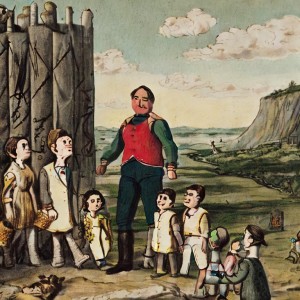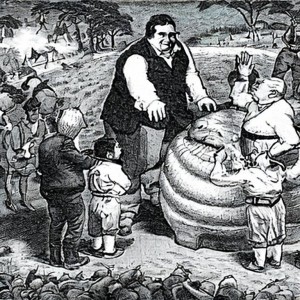“Traveling to some remote countries of the world in four parts: an essay by Lemuel Gulliver, first a surgeon, and then a captain of several ships” is the full title of a satirical novel, conceived by Johnathon Swift in 1720 and released in 1725-26.
The artistic image of the protagonist – an English surgeon and sailor Lemuel Gulliver originates from the seventeenth-century English prose, which is related to the stories of travelers made in the era of great geographical discoveries. The author of Travels hoped that the publication of the novel would help the young nobles eradicate social vices, but after publishing the book, he concluded that humanity cannot be corrected. With this thought, expressed in “Letter from Captain Gulliver to his relative Richard Simpson,” the novel opens, entirely aimed at exposing the personal and social problems of the modern author of European society.
The first country in which Gulliver falls after a terrible storm that smashed the ship into pieces is called Liliput. According to English literary critic Henry Morley, the word “lilliput” was formed by Swift based on two roots: “lilli” (in English – small) + “put” (from the Latin “putidus” – spoiled). The Liliputians are depicted by the author as a people indistinguishable from Europeans: they are headed by the emperor, the social system is a combination of aristocracy, the bourgeoisie and the peasants, the state carefully monitors both domestic and foreign policy.
The appearance of Gulliver in Liliput becomes a surprise for its inhabitants, but, having become convinced of the good intentions of the giant, they begin to use it for the good of the empire – as the main weapon against the neighboring island-state Blefusku. Enmity between neighboring countries is explained to Gulliver by a different approach to breaking an egg: from a sharp or blunt end (allegory to a struggle between Catholics and Protestants). Inside Liliput, there are also quarrels between the parties of the Tremeksenov and the Slemeksenov – high-henchmen and low-henchmen (an allegory of the division of the English aristocracy into the parties of tori and whig). At the heart of the image of the emperor of Liliput is a real historical character – King George II of England. Lilliput itself is also England, in which English state agents reign (the scene of a search of Gulliver’s pockets) and the Secret Committee monitoring the Jacobite activities.
The country of giants – Brobdingnag, where Gulliver himself plays the role of a midget, is revealed to the main character as accidentally as Lilliput: he lands on an unknown continent along with other sailors in search of fresh water. Taken as a small animal, a person eventually becomes the main fun of the kingdom and enters the palace, where he spends time in entertaining the queen and talking with the king. The latter listens attentively to Gulliver’s stories about the judicial, financial, and military system of England, which is very different from everything that is believed in Brobdingneg. The king of giants can hardly understand how such a tiny folk can have so much aplomb in order to make sophisticated unjust laws and wage bloody wars. Gulliver’s proposal to share with him the secret of gunpowder, the king, in horror, rejects: for a sovereign of simple farmers, whose work is valued more than the work of a whole imperial majesty, such a formidable weapon is of no use.
Giants are drawn by Gulliver as simple and down-to-earth people, distinguished by the direct logic of thinking, which is based on a few knowledge of morality, history, poetry and mathematics, the latter being used exclusively in the applied sense. Abstract ideas are not for Brobdingnag, just like the laws, whose verbal length does not go beyond the number of letters of the local alphabet. Comments to the laws of the giants not only are absent, they are also considered a great crime. There is no civil and criminal proceedings in Brobdingnag.
Gulliver’s stay in the country of giants allows the author to show the human body from an unexpected side: the tiny hero looks at a terrible female breast, thick hairs on the skin, huge pores and nightmarish pigment spots under a magnifying glass. The nipple, on which the ladies of the court put Gulliver, seems to him disgusting. The hero understands how conditional everything is in the world, because upon closer inspection a woman will not be as charming as it seems at first glance.
Gulliver’s third journey reveals to the reader three eternal problems of humanity:
1. The relationship between science and life, where science soars beyond the reach of mere mortals (the island of Laputa, populated by aristocracy obsessed with astronomy and geometry), and life slowly goes on as usual, more and more plunging into ignorance and poverty.
2. The degeneration of humanity that the hero traces on Glubbdubdrib Island, whose inhabitants are wizards, summon for him dead historical personalities and ordinary Europeans.
3. The futility of immortality, which the author draws as a miserable old age, devoid of both physical and mental powers. While Gulliver believes that the possibility of continuous development and accumulation of knowledge remains beyond eternal life, the inhabitants of Luggnagg know for certain that after eighty years nature takes its own. Local struldbrugs — the immortal — are the most unhappy people on earth, since neither youth nor death is available to them.
The apotheosis of human criticism in Gulliver’s Travels is the fourth part, in which the protagonist enters the country of intelligent horses – guigngs. The local state is distinguished by an even simpler device than Brobdingnag. The main feature of guingnms is the inability to lie. Horse language is not as rich as English, but it is enough to exchange simple thoughts expressing the essence of what is happening. In the land of horses, Gulliver becomes the most disgusting character – a reasonable variant of local ex, similar in part to monkeys, partly to degenerate people. In the hero, the hero sees the same vices as in the Europeans, they only appear in a more mundane form. The latter so averts Gulliver from humanity, that after returning to England (where he is brought by force), he has been learning to be in the company of his wife and children for many years.

